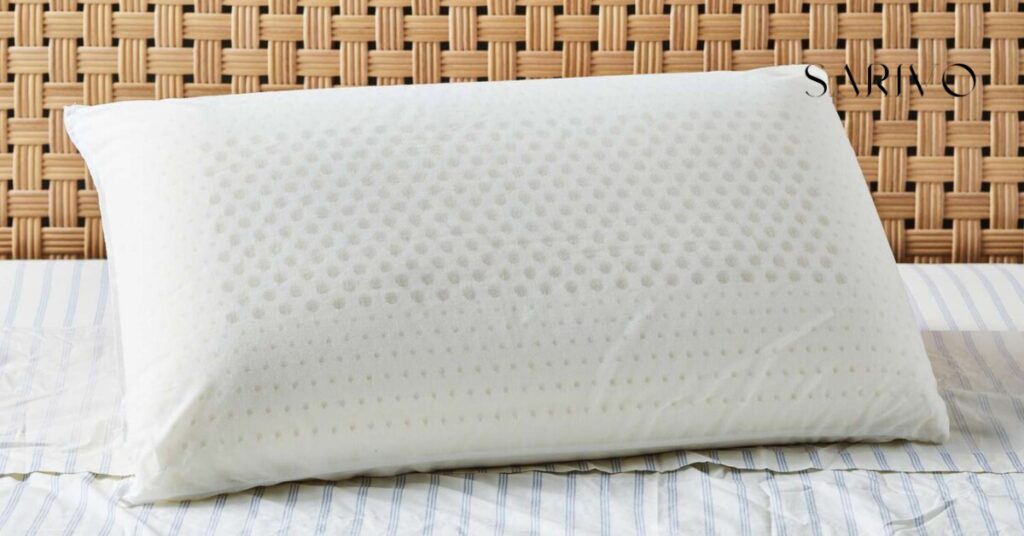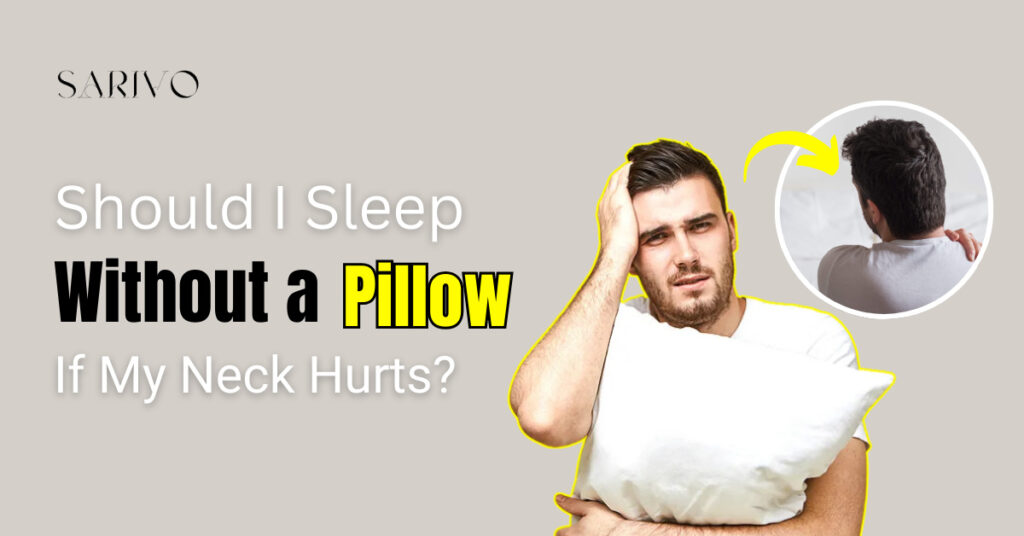Sleeping without a pillow can help relieve neck pain for some individuals. It aligns the spine and reduces strain.
Neck pain can be a debilitating condition, affecting sleep quality and daily activities. Choosing the right sleeping position and pillow can significantly impact neck health. Some people find that sleeping without a pillow helps maintain spinal alignment, reducing discomfort. Others might need specific types of pillows to support their neck properly.
Personal preferences and individual anatomy play crucial roles in determining the best approach. Consulting a healthcare professional can provide personalized advice. Understanding the importance of proper neck support during sleep can lead to more restful nights and improved overall well-being.
Neck Pain Causes
Struggling with neck pain can be frustrating, especially at night. Many people wonder, “Should I sleep without a pillow if my neck hurts?” Understanding the causes of neck pain can help decide the best sleeping position and pillow use. Let’s explore the common causes of neck pain.
Muscle Strain
Muscle strain is a frequent cause of neck pain. It occurs when muscles are overused or injured. This can result from various activities and habits. Here are some common causes:
- Overuse: Spending long hours at a computer or looking at a phone.
- Sudden Movements: Quick, jerky movements can strain neck muscles.
- Physical Activities: Engaging in sports without proper warm-up.
Muscle strain can lead to stiffness, pain, and limited movement. Stretching and strengthening exercises can help alleviate the pain. Using a supportive pillow can also reduce muscle strain.
Poor Posture
Poor posture is another significant cause of neck pain. Slouching or hunching over can put extra pressure on the neck muscles and spine. Here are some examples of poor posture habits:
- Slouching: Sitting in a slouched position for extended periods.
- Forward Head Posture: Leaning the head forward while using devices.
- Incorrect Sleeping Position: Sleeping on the stomach can strain the neck.
Maintaining good posture is essential for preventing neck pain. Here are some tips to improve posture:
| Tip | Description |
| Ergonomic Workstation | Ensure your desk and chair support proper alignment. |
| Frequent Breaks | Take breaks to stretch and move around every hour. |
| Supportive Pillow | Use a pillow that maintains the natural curve of your neck. |
Improving posture can significantly reduce neck pain and improve overall comfort.

Pillow Benefits
Neck pain can be a real nuisance and can disrupt your sleep. Many people wonder if sleeping without a pillow could alleviate their discomfort. Pillows offer several benefits that can be crucial for a good night’s sleep and overall neck health. Understanding these benefits can help you decide whether to ditch the pillow or not.
Spinal Alignment
One of the key benefits of using a pillow is maintaining proper spinal alignment. When your spine is aligned correctly, you reduce the risk of waking up with neck pain or stiffness. Here are some ways pillows help with spinal alignment:
- Neck Support: A good pillow keeps your neck aligned with your spine, reducing strain on neck muscles.
- Shoulder Relief: Pillows can also help relieve pressure on your shoulders, which can contribute to overall spinal alignment.
- Posture Correction: Sleeping with a pillow can correct poor sleeping postures, such as sleeping on your stomach, which can twist your neck.
Here’s a table to illustrate how different types of pillows affect spinal alignment:
| Pillow Type | Spinal Alignment Benefit |
| Memory Foam | Contours to your neck and head, providing customized support. |
| Feather | Offers soft, moldable support, but may not be as firm as needed for some. |
| Orthopedic | Specifically designed to maintain spinal alignment, especially for back and side sleepers. |
Comfort Support
Comfort is another significant benefit that pillows offer. A comfortable pillow can improve sleep quality and make you feel more rested. Here’s how pillows provide comfort support:
- Pressure Relief: Pillows can relieve pressure points, reducing the likelihood of waking up in pain.
- Temperature Regulation: Some pillows are designed with cooling materials, helping you stay comfortable throughout the night.
- Variety of Options: Pillows come in various shapes, sizes, and materials, allowing you to find one that suits your personal comfort needs.
Consider the following factors to find a pillow that offers the best comfort support:
- Material: Choose from memory foam, latex, or down, based on your comfort preference.
- Firmness: Select a firmness level that supports your head and neck without causing discomfort.
- Shape: Ergonomic or contoured pillows can provide targeted support for different sleeping positions.
By choosing the right pillow, you can enhance your comfort and reduce neck pain, making it easier to get a restful night’s sleep.
Sleeping Positions
Neck pain can make it hard to sleep. Finding the right sleeping position can help. Should you sleep without a pillow if your neck hurts? Let’s explore different sleeping positions.
Back Sleepers
Back sleepers might find relief from neck pain by using a small pillow. A thin pillow supports the natural curve of the neck. Sleeping without a pillow might worsen neck pain. Here’s why:
- Proper Alignment: A thin pillow keeps the spine aligned.
- Neck Support: It supports the neck’s natural curve.
For back sleepers, a table can help choose the right pillow:
| Pillow Type | Benefits |
| Thin Pillow | Maintains alignment, reduces strain |
| Memory Foam Pillow | Adapts to neck shape, offers support |
Using a pillow under the knees can further reduce strain on the spine. This position can help keep the spine in a neutral position. So, back sleepers might benefit from a pillow rather than sleeping without one.
Side Sleepers
Side sleepers need a different approach. A thick pillow keeps the head aligned with the spine. Without a pillow, the head tilts down, causing neck strain. Here are some tips for side sleepers:
- Use a Thick Pillow: Keeps head and neck aligned.
- Support Between Knees: A pillow between the knees can help keep the spine straight.
Side sleepers can benefit from specific pillow types:
| Pillow Type | Benefits |
| Contour Pillow | Supports neck curve, maintains alignment |
| Body Pillow | Provides full-body support, reduces strain |
Side sleepers often find a pillow essential for comfort. A pillow helps maintain proper alignment. It can prevent neck pain and improve sleep quality. So, sleeping without a pillow is not ideal for side sleepers.
Effects Of No Pillow
Dealing with neck pain can be frustrating. Many wonder if sleeping without a pillow might help. Understanding the effects of no pillow on neck support and spinal health is crucial. Let’s explore these aspects.
Neck Support
Neck support is vital for pain relief. Sleeping without a pillow can change how your neck aligns with your spine. This could reduce or increase pain depending on your sleeping position.
Here are some key points to consider:
- Back Sleepers: Sleeping without a pillow might let your head sink down, keeping your neck aligned with your spine.
- Side Sleepers: Your head needs elevation to stay aligned with your spine. No pillow can cause neck strain.
- Stomach Sleepers: This position might benefit most from no pillow, as it prevents unnatural neck bending.
Consider your sleep position when deciding to use a pillow. Proper neck support reduces pain and promotes better sleep.
Spinal Health
Spinal health is equally important. Sleeping without a pillow affects your spine’s alignment, which can impact overall health.
Here are the effects based on sleeping positions:
| Position | Effect on Spine |
| Back Sleepers | May maintain natural spine curve, reducing lower back strain. |
| Side Sleepers | Could cause misalignment, leading to pain in the neck and spine. |
| Stomach Sleepers | Helps keep spine straight, reducing back stress. |
Maintaining spinal health ensures fewer aches and pains. Choosing to sleep without a pillow depends on how it affects your spine’s natural alignment.
Pillow Types

Choosing the right pillow can make a significant difference if your neck hurts. Selecting a pillow that offers proper support and comfort is essential. Let’s explore two popular types of pillows that can help relieve neck pain: Memory Foam and Latex.
Memory Foam
Memory foam pillows are designed to mold to the shape of your head and neck. This can provide excellent support and alleviate neck pain. Here are some key benefits of memory foam pillows:
- Pressure Relief: The foam contours to your head, reducing pressure points.
- Spinal Alignment: Keeps your spine aligned, reducing strain on your neck.
- Durability: Memory foam pillows are long-lasting and maintain their shape.
Memory foam pillows come in various shapes and sizes. Here is a table showing some popular types:
| Type | Description |
| Traditional | Standard pillow shape, offers good support. |
| Contour | Curved design to support neck and shoulders. |
| Wedge | Inclined shape, ideal for back sleepers. |
Memory foam pillows are a great choice for those with neck pain. They provide customized support and help maintain proper alignment.
Latex
Latex pillows are another excellent option for neck pain sufferers. They offer a different kind of support compared to memory foam. Here are some advantages of latex pillows:
- Natural Material: Made from natural latex, hypoallergenic, and resistant to dust mites.
- Firm Support: Provides firmer support than memory foam, maintaining shape.
- Breathability: Latex pillows have excellent air circulation, keeping you cool.
Latex pillows come in various designs. Here is a table highlighting some common types:
| Type | Description |
| Shredded | Filled with shredded latex, adjustable for comfort. |
| Solid | One-piece latex, provides consistent support. |
| Contoured | Ergonomic design, supports neck and head. |
Latex pillows are durable and offer excellent support. They are ideal for those seeking a firmer pillow that keeps cool throughout the night.
Personal Preferences
Choosing to sleep without a pillow when your neck hurts can depend greatly on personal preferences. Everyone has unique needs and comfort levels. Understanding these preferences can help you make an informed decision. Let’s explore how your comfort levels and sleep quality can be impacted.
Comfort Levels
Comfort levels play a significant role in deciding whether to sleep without a pillow. Everyone’s definition of comfort varies, and what works for one person might not work for another. Consider the following factors:
- Sleeping Position: Your usual sleeping position can impact your comfort without a pillow. For instance, back sleepers might find it easier to sleep without a pillow compared to side sleepers.
- Mattress Type: The type of mattress you sleep on also influences comfort. A firm mattress may provide adequate neck support without a pillow, while a softer mattress might not.
- Neck Pain Severity: The severity of your neck pain is another crucial factor. Mild pain might be alleviated by sleeping without a pillow, but severe pain could require extra support.
Here is a table summarizing these factors:
| Factor | Impact on Comfort Without Pillow |
| Sleeping Position | Back sleepers may find it more comfortable than side sleepers. |
| Mattress Type | Firm mattresses may offer better support without a pillow. |
| Neck Pain Severity | Mild pain might improve, severe pain might need more support. |
Sleep Quality
Sleep quality is another crucial aspect to consider. Good sleep quality is essential for overall health and well-being. Here are some key points to think about:
- Alignment: Proper spine and neck alignment is crucial for good sleep quality. Sleeping without a pillow may help some people achieve better alignment.
- Restfulness: How rested you feel in the morning can indicate sleep quality. If you wake up feeling refreshed without a pillow, it might be beneficial for you.
- Sleep Disturbances: Frequent waking during the night can affect sleep quality. Experimenting with or without a pillow can help determine what reduces disturbances.
Consider these points in detail:
Alignment: Your spine and neck should be in a neutral position while you sleep. This reduces strain and can improve sleep quality. Without a pillow, some people find better alignment, especially if they sleep on their back or stomach.
Restfulness: Feeling rested in the morning is a good sign of high sleep quality. If sleeping without a pillow makes you feel more rested, it might be the right choice. Track how you feel each morning to assess changes.
Sleep Disturbances: Waking up frequently can lower your sleep quality. Test different pillow options and see what helps you sleep through the night. Record any changes in sleep patterns to find the best setup for you.
When To Avoid Pillows

Should you sleep without a pillow if your neck hurts? This question often puzzles many people. Sometimes, using a pillow can worsen neck pain. Knowing when to avoid pillows is crucial for better sleep and neck health. Here, we explore specific situations where sleeping without a pillow may be beneficial.
Certain Injuries
Some injuries make using a pillow problematic. For instance, whiplash injuries often cause neck pain. A pillow might strain the neck further.
- Whiplash: This injury involves sudden neck movement. Pillows might not offer proper support.
- Sprains and Strains: Neck sprains and strains need a neutral position. Pillows can disrupt this alignment.
- Fractures: Neck fractures require special care. Using a pillow can misalign the neck.
Doctors often advise avoiding pillows in these cases. Here’s a quick reference table:
| Injury Type | Why Avoid Pillows? |
| Whiplash | Pillows may not provide proper support. |
| Sprains and Strains | Pillows can disrupt neck alignment. |
| Fractures | Pillows might misalign the neck. |
Specific Conditions
Certain medical conditions may also warrant avoiding pillows. Cervical spondylosis is a condition where neck bones wear down. Pillows can worsen this pain.
- Cervical Spondylosis: This condition involves wear and tear. Pillows may add pressure to the neck.
- Degenerative Disc Disease: This disease affects spinal discs. A pillow can worsen the condition.
- Neck Arthritis: Arthritis in the neck needs careful handling. Pillows can cause additional strain.
In these conditions, doctors may recommend sleeping without a pillow. Here’s a quick reference table:
| Condition | Why Avoid Pillows? |
| Cervical Spondylosis | Pillows may add pressure to the neck. |
| Degenerative Disc Disease | Pillows can worsen the condition. |
| Neck Arthritis | Pillows can cause additional strain. |
Expert Recommendations
Sleeping without a pillow can be a tough choice, especially if your neck hurts. Many people wonder if ditching the pillow can actually help. To answer this question, let’s dive into expert recommendations from chiropractors and physical therapists.
Chiropractors
Chiropractors focus on spinal alignment and overall posture. According to them, the right pillow can make a big difference. They often recommend pillows that support the natural curve of your neck. Here are some of their key points:
- Support: A good pillow supports the neck’s natural curve. It helps keep the spine aligned.
- Firmness: Choose a pillow with medium firmness. It shouldn’t be too soft or too hard.
- Material: Memory foam or cervical pillows are often recommended. They adapt to your neck’s shape.
Chiropractors also suggest sleeping on your back or side. These positions reduce neck strain. They advise against sleeping on your stomach. This position twists the neck and increases pain.
| Sleeping Position | Recommended Pillow Type |
| Back | Memory foam or cervical pillow |
| Side | Medium-firm pillow |
Physical Therapists
Physical therapists aim to relieve pain and improve function. They also have specific advice about sleeping without a pillow. Here’s what they say:
- Neck Alignment: The head should stay in line with the spine. A pillow can help achieve this.
- Muscle Support: A pillow supports neck muscles. It can reduce strain and discomfort.
- Height: The pillow’s height should match your sleeping position. A higher pillow for side sleepers, a lower one for back sleepers.
Physical therapists often recommend personalized solutions. They may suggest exercises to strengthen neck muscles. These exercises can support the neck during sleep.
For side sleepers, they advise using a pillow that fills the gap between the shoulder and head. For back sleepers, a thinner pillow works best. They also stress the importance of a comfortable mattress. A good mattress can complement the pillow and improve sleep quality.
| Sleeping Position | Recommended Pillow Height |
| Side | Higher pillow |
| Back | Lower pillow |
Conclusion
Exploring whether to sleep without a pillow can help alleviate neck pain. Each person’s needs differ. Experiment with various sleep positions and pillow types. Consult a healthcare professional for personalized advice. Prioritize comfort and support for a restful night’s sleep and a pain-free neck.

